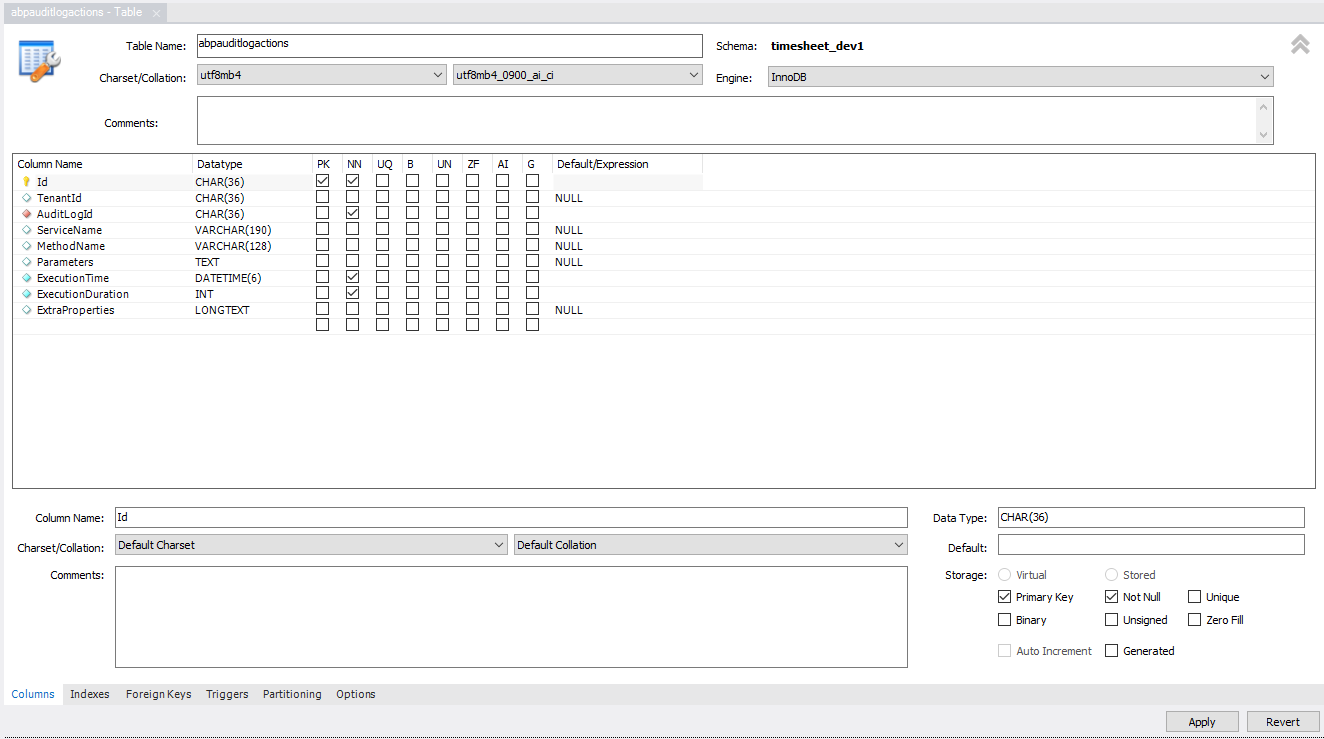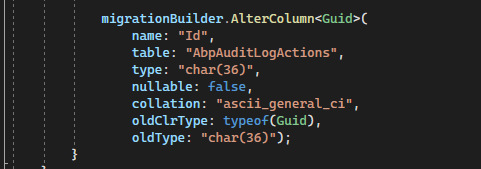Thank you. So how does the security of .NET 6 compare to .NET 7?
Because I've just done some research, .NET 7 has faster performance indeed, but nowhere mentions the improvement of security between 2 versions, so I assume it's pretty much the same, doesn't it?
Hi Supporting Team,
I'm planning for a major version upgrade in expecting for security enhancement. I've read through the changed logs but seemed not to catch as many related information about it. So I have a few things to consider:
Identity Server with OpenIddict? Does it have anything to do with security enhancement?Could you guys share your thoughts about it?
Hi, is there any update?
I tried to put modelBuilder.UseGuidCollation(string.Empty); in DbContextModelCreatingExtensions instead of DbContext and run migration, the parameter collations for newly created column are all disappeared, which is good, but it also alters current columns collation:



Because current columns use default collation, their collation parameter shouldn't be added, and surely not ascii_general_ci.
Could you guy take a look at this?
Hi Support Team,
I've tried to create a dozen of tables using code-first EF Core, there're 2 tables having foreign key to abpusers table.
I created domain classes, declared them in DbContextModelCreatingExtensions as well as in DbContext , ran add-migration command, a migration file was created. After that, I ran DbMigratorproject, an issue appeared:
1.Failed to open the referenced table 'appuser': I solved this one by manually modifying the migration file, changed parameter name in table.ForeignKey() and principalTable from AppUser to AbpUsers at the 2 tables having foreign key.
Then I ran the add-migration command again, another issue appeared:
2.Referencing column 'UserId' and referenced column 'Id' in foreign key constraint 'FK_my_table_AbpUsers_UserId' are incompatible.: I also solved this one by manually deleting parameter collation: "ascii_general_ci"at columns UserIdin the file and ran the command again. All worked well.
But, is there any way to remove the collation: "ascii_general_ci param and just uses the default type when migration file is generated? I notice this param is automatically added after the framework is updated to v5 (.NET 5 => .NET 6).
I've tried an answer from stackoverflow but didn't work.
Also, I really appreciate if there's any solid solution for the 1st issue.
Hope to hearing from you guys soon.
Perfect! QA's package is a bit different but I still managed to make it work. Thank you so much.
Can you send your package.json ? https://drive.google.com/file/d/1BcqXOAeBxPdKhjVqB_Gv9eOAXiQkucBE/view?usp=share_link
Hello,
Can you try after removing
yarn.lockfile andnode_modulesfolder and installing packages with the yarn command?You can check the installed package version with
yarn why @abp/ng.components
I removed yarn.lock, package-lock.json files and node_modules folder, then install with npm install --save --legacy-peer-deps command as npm install encountered unable to resolve dependency tree error.
Now the local environment gets the same error likes the others.
Edit: The package-lock.json is re-installed with many v5.3.5 packages, but the yarn.lock file didn't get re-installed.
Hello,
I am able to reproduce the error. The bug is related to version 5.3.5. Can you add the following lines to your
package.json?"resolutions": { "@abp/ng.components": "5.3.4", "@abp/ng.core": "5.3.4", "@abp/ng.setting-management": "5.3.4", "@abp/ng.theme.lepton-x": "1.0.0-beta.3", "@abp/ng.theme.shared": "5.3.4", "@volo/abp.commercial.ng.ui": "5.3.4", "@volo/abp.ng.account": "5.3.4", "@volo/abp.ng.audit-logging": "5.3.4", "@volo/abp.ng.gdpr": "5.3.4", "@volo/abp.ng.identity": "5.3.4", "@volo/abp.ng.identity-server": "5.3.4", "@volo/abp.ng.language-management": "5.3.4", "@volo/abp.ng.saas": "5.3.4", "@volo/abp.ng.text-template-management": "5.3.4", "@volo/abp.ng.theme.lepton": "5.3.4" }
Hi muhammedaltug, thank you for your supporting. But it doesn't work as I added the code and deployed it to the develop environment.
Am I missing something?

